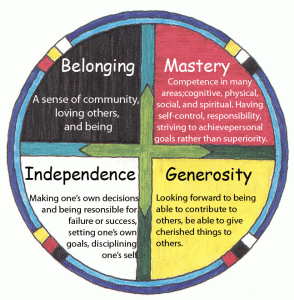A recurring theme in our literature review on Aboriginal health is viewing health as a process, not a product: health as a process of decolonizing spirit, heart, body and mind; health as a process of nurturing the whole person and the learning spirit; and health as a process of creating community.
Lifelong learning and lifelong health are connected; the role of the school is to not only to help students to be healthy as children, but also to grow into healthy adults who belong to healthy communities. As such, health needs to be woven into all aspects of school life. While at times, it may be appropriate to teach specific health topics, it is more important that health is a consideration in all decisions made about the school, its teachers and its students.
Learn More: Resources
- Learning the Path: A CBC series about Alberta schools who are incorporating Aboriginal culture, history, ceremony and art into all aspects of school life from elementary to post-secondary.
- A Small Gathering for the Healing of Our Aboriginal Languages
- The Alaska Native Knowledge Network (ANKN) is an AKRSI partner designed to serve as a resource for compiling and exchanging information related to Alaska Native knowledge systems and ways of knowing, including a database of lessons and units for diverse subject areas.
